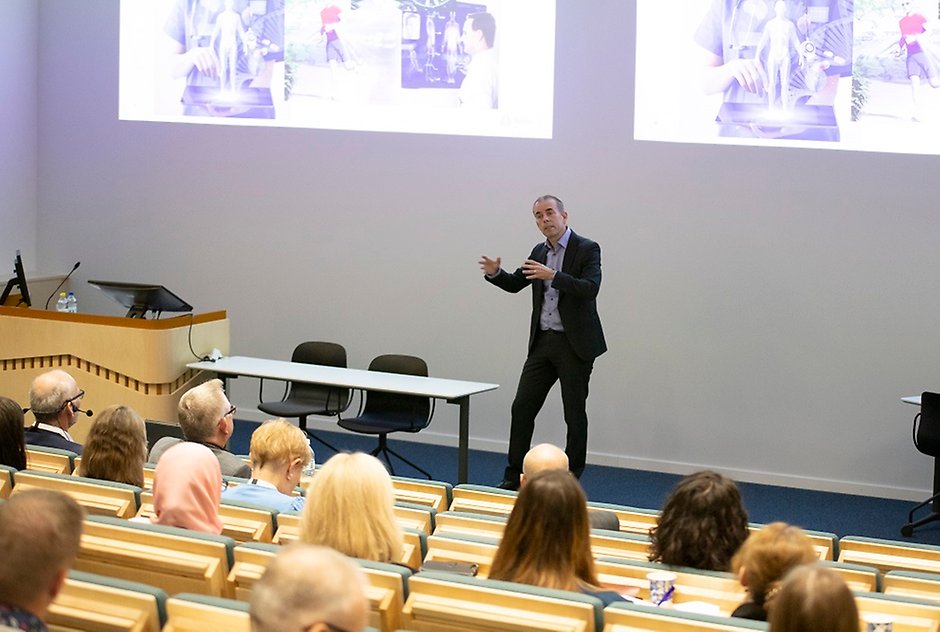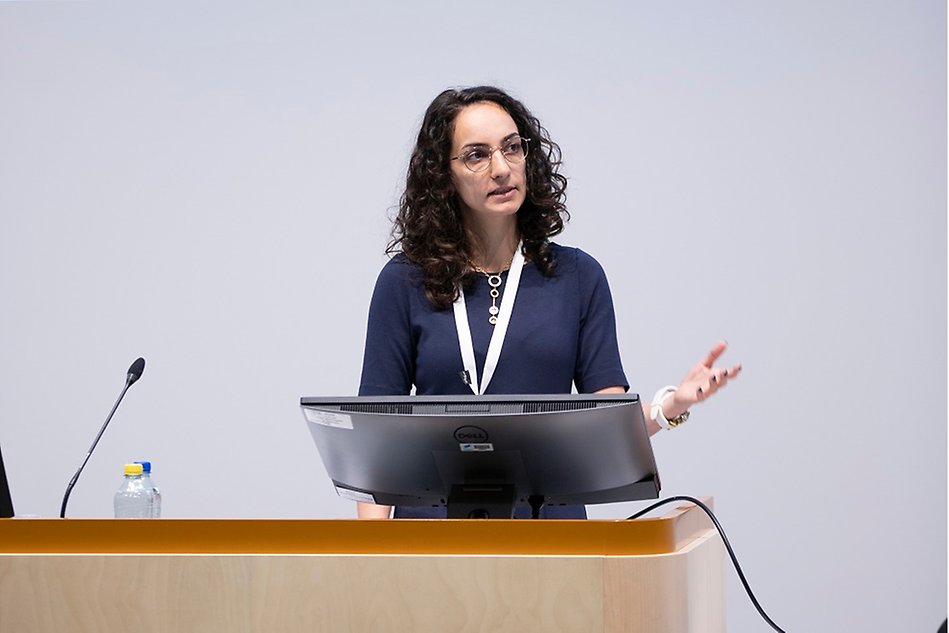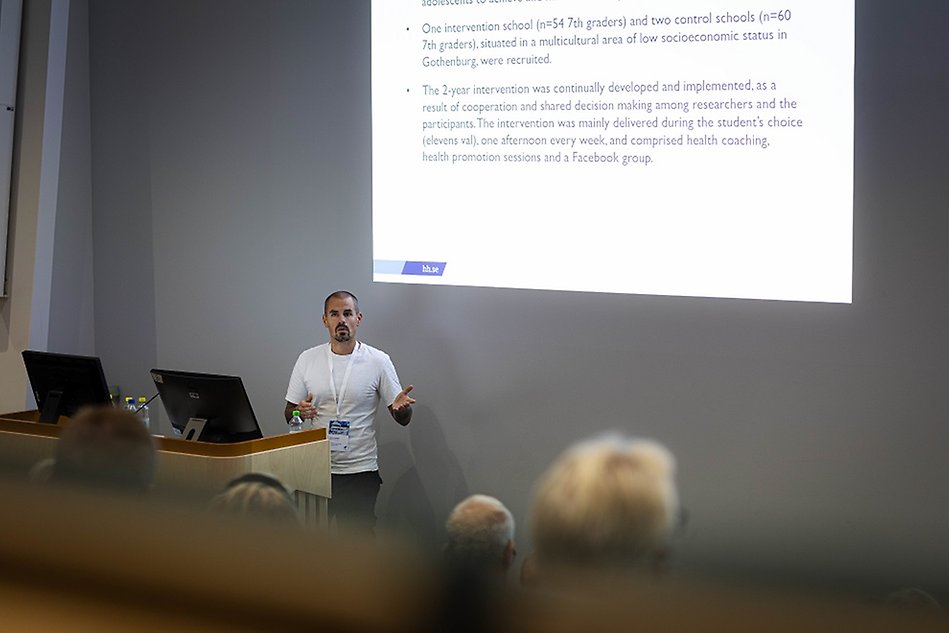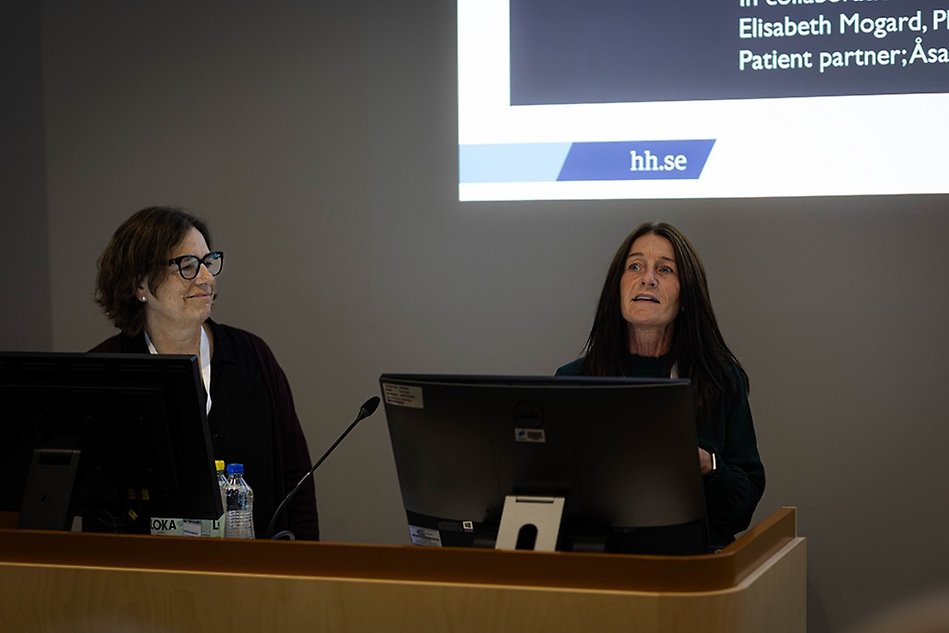Innovation Conference 2022 – Health Innovation
On Wednesday September 28, Halmstad University had its yearly innovation conference. It was organised by the University’s focus area Health Innovation and focused on information-driven care and the importance of movement for health. Several speakers participated, and among the audience were interested parties from the public sector, higher education, and the business community.
“What characterises the healthcare of tomorrow is, among other things, working proactively with health in everyday life, technology that replaces work tasks and collaborating with new actors.”
Johan Färnstrand, Chairman of the Board for Aleris Sjukvård AB
The healthcare of tomorrow
Johan Färnstrand, Chairman of the Board for Aleris Sjukvård AB, began the conference with speaking about challenges and possibilities regarding people’s health. He said that the challenges, among other things, are changed demography, digitalisation, new demands and limited finances. He mentioned that there are many technical solutions but said that what would actually make a difference is to free up more time for both patients and staff.
“What characterises the healthcare of tomorrow is, among other things, working proactively with health in everyday life, technology that replaces work tasks and collaborating with new actors”, Johan Färnstrand said.
The history of health innovation at the University
Thorsteinn Rögnvaldsson, Deputy Vice-Chancellor with a responsibility for research, gave a brief history lesson regarding the University’s work with health innovation: from the first stumbling steps in 2004 with visions of cross-disciplinary doctoral studies, the difficulties during the next decade with making this a reality, to establishing the two focus areas Health Innovation and Smart Cities and Communities.
After that, the conference was divided into two tracks: Information-driven care and Movement for health and performance. During the day, the participants could also visit the University’s laboratories – Rydberg Core Laboratory, Leap for Life, and the Health Lab – while listening to presentations of what work is being done there.

Johan Färnstrand spoke about challenges and possibilities regarding people’s health.
Healthcare needs to transform
Those who chose to listen to the track concerning information-driven care could hear Mattias Ohlsson, Professor of Machine Learning, introduce this subject. Information-driven care is about gathering data to get information that leads to insight, change of behaviour, and benefits for the patients, he informed the listeners.
Petra Svedberg, Professor of Nursing, and Jens Nygren, Professor of Health Innovation, then shared some insights from their research on artificial intelligence implementation in healthcare.
“There is a knowledge gap regarding AI implementation. The focus has primarily been on the development of AI applications, while less attention has been given to understanding how one should introduce and regularly use them in clinical practice”, Jens Nygren said.
Important with balance and transparency
Jeaneth Johansson, Professor of Business Administration and Accounting and Control, spoke of different types of ecosystems between, for example, companies, hospitals and primary care, and organisational challenges with information-driven care. She said that it is hard to find a balance between different parties who have different perspectives.
“It is also about risk management and accountability since innovative solutions mean new risks. Who is responsible when you implement a new system? Do you dare to take the risk?” Jeaneth Johansson asked.
Kobra (Farzaneh) Etminani, Senior Lecturer and Docent in Machine Learning, gave a lecture about AI and healthcare. She talked about how you can develop trustworthy AI models by using all patient data available and, in that way, illustrates how an illness develops over time.
“In theory, this makes it possible to use the models as a prognosis tool. However, to make AI seem trustworthy, it needs to be transparent and be able to explain to the doctor why it reached a certain conclusion”, Kobra Etminani said.

Kobra Etminani gave a lecture about how you can develop trustworthy AI models.
Perspectives from leaders within healthcare
Lena Petersson, Senior Lecturer of Pedagogy, began the part of the conference about current research news by speaking about how she researches on leaders’ perspectives on challenges with implementing AI in healthcare. She explained that they feel that it is problematic that technology often is being developed before the necessary legal framework, that higher education does not offer sufficient knowledge regarding digitalisation, and that it is important to involve all staff when implementing new technologies.
Margit Neher, Senior Lecturer in Implementation Science, is currently researching on the same subject but focusing on how leaders experience the technology itself. They often think that AI is more efficient and less biased, but there are question marks regarding how the technology should be implemented, how adaptable it is, the quality of the design and the cost.
They make AI more accessible
The Health Data Centre (HDC) is a newly started centre for research to realise the potential of AI for patients and healthcare systems. Louise Wandel, the Coordinator, explained that the reason behind it is the many challenges within healthcare and a wish to develop efficient care without losing quality. Working fact-based with information-driven care is a part of the solution. HDC offers a technological platform, insights into the Swedish healthcare system and data management, and makes it possible to share data without sharing data – the algorithm can learn from data without actually extracting them.
“It is a giant jigsaw puzzle, and we are just a small puzzle piece in all of it”, Louise Wandel said.
AI in real life
During the day, the latest research about how AI can be used in real life within healthcare was presented. Elin Siira, Postdoctoral Fellow of Health Innovation, began by talking about her research on automated processes regarding anamnesis and triage within primary care.
Amira Soliman, Associate Senior Lecturer in Information Technology, then offered some examples of how AI can be used to predict the need for care among patients suffering from heart failure, while Monika Nair, Postdoctoral Fellow of Health Innovation, is doing research on how machine learning can be used to improve the decision basis when someone with the same diagnosis is going to be discharged from the hospital.
“There is a technology fatigue within healthcare today since the staff members are already using several different tools on a daily basis. They only want new technology to be implemented when it is relevant and useful”, Monika Nair said.
Fábio Gama, Senior Lecturer of Innovation Science, talked about automated idea detection (AID) and how AI can be used in the fight against healthcare-associated infections. After that, Hélène Laurell, Senior Lecturer of Business Administration, presented MeTARoad, a partnership between the University and the industry, to commercialise and implement health technological innovations.
“One of the main factors behind our behaviour is motivation”
The second track during the conference was Movement for Health and Performance, which is also expected to become a research programme at the University. The programme is divided into three parts – sustainable sports participation, sustainable exercise and rehabilitation, as well as sustainable physical activity for everyone – and will be led by Charlotte Olsson, Senior Lecturer of Biomedicine, and Andreas Ivarsson, Professor of Psychology.
“A lot of the research in this programme is about the way we act, and one of the main factors behind our behaviour is motivation”, Andreas Ivarsson said when he welcomed the main speaker Nikos Ntoumanis, Professor of Motivation Science, from the University of Southern Denmark in Odense.
Nikos Ntoumanis spoke of several projects and theories within motivation science, such as how we understand rational and irrational behaviours connected with physical activity.
Physical activity among children and young adults
When speaking about physical activity among children and young adults, Linus Jonsson, Postdoctoral Fellow of Sports Science, talked about his dissertation project about school-based interventions to promote young people's physical activity. He shared several learnings, such as the importance of seeing the entirety of the matter.
“You cannot go into a pupil’s choice class and play around a little, but instead, you need to think about the entire picture for it to have an impact. How do the students get to school, how can you offer activities after school, how do you get them to be active during breaktime?” Linus Jonsson said.
Jenny Back, Doctoral Student of Health and Lifestyle, spoke about the ongoing project “Psychosocial risk factors for dropping out from football training for children and young people”, which engaged the audience, where many had children of their own in kids football clubs. A listener wondered whether competition versus training was a factor for continuing with the sport.
“You have just put your finger on one of the factors. You need to be allowed to participate even if you do not want to become a professional or the best player in the world”, Jenny Back said.

Linus Jonsson's dissertation project is about school-based interventions to promote young people's physical activity.
Anxiety the most widespread disease
Another factor that can affect athletes’ willingness or ability to continue is their psychological well-being. Johan Ekengren, Senior Lecturer of Health and Lifestyle with a specialisation in Sports Psychology, is doing research on psychological strategies to promote health and performance within high-performance sports. He is collaborating with a number of different partners, for example, the Swedish Handball Federation, IFK Kristianstad, the Swedish Ice Hockey Association and the Swedish Olympic Committee.
Johan Ekengren mentioned that in 2017, the WHO signalled that anxiety is the most widespread disease around the globe. He meant that we seem to feel a little worse, even though we are living longer lives, and continued to describe the difficulty with psychology:
“It is very hard to solve an internal problem the same way we solve an external problem. If my bike has a flat tire, I fix it, but how do you fix a feeling?”
Exercise to combat chronic illnesses
Another topic during the day was physical exercise for people with chronic illnesses. Emma Haglund, Docent in Biomedicine specialising in Physical Activity and Exercise, and Åsa Andersson, Professor of Biomedicine, among other things, spoke of the consequences of individualised high-impact interval training for people with chronic inflammatory back pain and how factors such as exercising individually or in a group can affect their health.
Maria Andersson, Docent and Research Manager at FoU Spenshult, spoke of factors influencing knee osteoarthritis patients to work out. She talked about the project HALLOA and the significance of physical strain and movement patterns for knee osteoarthritis to develop.

Emma Haglund and Åsa Andersson spoke of the consequences of high-impact interval training for people with back pain.
Collaboration the key word
The common thread throughout the day's lectures was the importance of successful collaboration between different parties – between different disciplines, new and existing players, man and technology; between healthcare and patients, athletes and coaches, children and school. After a full day of inspiring talks, it was clear that in a world that is getting increasingly individualised, it is more important than ever to continue to work across borders and together to improve our healthcare and health.
Text: Linnéa Andersson and Emma Swahn
Translation: Emma Swahn
Photos: Dan Bergmark and Albin Edin

